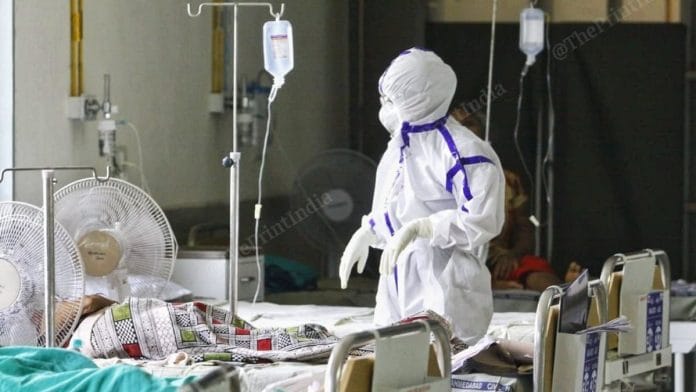New Delhi: A new study published in The Lancet Respiratory Medicine Friday has found that hospitalised Covid-19 patients were twice as likely to recover from the infection by inhaling interferon beta-1a — a naturally-occurring protein that coordinates the body’s immune response to a viral infection.
Patients who received interferon beta-1a were less likely to develop severe symptoms than those who received placebos, the study noted. It was conducted on 98 hospitalised patients in the UK between 30 March and 30 May.
This is the first evidence of inhaled interferon beta-1a reducing the clinical consequences of Covid-19 that has been published in a peer-reviewed medical journal.
The study serves as a proof-of-concept that this treatment could help hospitalised patients recover, even though the scientists have noted that further research was required.
Also read: Covid patients at risk of developing psychiatric illnesses, shows Oxford study of US records
‘Potential to restore lung’s immune response, fasten recovery’
The formulation of interferon beta used in this new study — SNG001 — was directly delivered to the lungs via inhalation. It was earlier trialled in the treatment of asthma and chronic obstructive pulmonary disease (COPD).
Interferon beta-1a is also used as an intramuscular injection to treat adults with various forms of multiple sclerosis.
This study aimed to evaluate the safety and efficacy of SNG001 to treat hospitalised Covid-19 patients.
“The results confirm our belief that interferon beta, a widely known drug approved for use in its injectable form for other indications, may have the potential as an inhaled drug to restore the lung’s immune response and accelerate recovery from Covid-19,” said the study’s lead author, Tom Wilkinson, from the University of Southampton, UK, in a statement.
“Inhaled interferon beta-1a provides high, local concentrations of the immune protein, which boosts the lung’s defenses rather than targeting specific viral mechanisms,” Wilkinson added.
The study was funded by UK-based biotech firm Synairgen Research Ltd. It was conducted by researchers from the Synairgen Research Ltd, Southampton General Hospital, University of Southampton, University of Oxford, TranScrip Partners, and Veramed.
The trial was conducted on Covid-19 patients at nine UK hospitals. It compared the effects of SNG001 and placebos given to patients once daily for up to 14 days. Patients were monitored for a maximum of 28 days after the start of the treatment.
Patients were also randomly assigned into groups receiving treatment and placebo. All members of the research team were blinded to which group the patients were allocated.
What the study found
A total of 101 patients were initially enrolled in the study but only 98 patients were given the treatment as three withdrew from the trial. Of the 98, 48 received SNG001 and 50 were given a placebo.
In the course of the trail, 66 patients (67 per cent) required oxygen supplementation. Of this, 29 were from the group who were given placebo and 37 from the SNG001 group. The trial found that patients who received SNG001 were twice as likely to show an improvement in their condition at day 15 or 16, compared with the placebo group.
Of the 50 patients in the placebo group, 11 patients (22 per cent) developed severe complications, which this study defined as requiring mechanical ventilation, or died between the first dose and day 15 or 16. In comparison, six patients (13 per cent) out of 48 who received SNG001 developed severe complications.
Over the 14-day treatment period, patients who received SNG001 were more than twice as likely to recover, compared to those in the placebo group. As many as 21 patients (44 per cent) in the SNG001 group recovered, compared to 11 (22 per cent) in the placebo group.
The authors also found that on the 28th day, SNG001 patients were over three times more likely to recover than patients given placebo.
In terms of adverse effects, fewer patients in the SNG001 group had serious complications compared with the placebo group. The adverse effects were monitored for 28 days.
The study found that 26 patients (54 per cent) in the SNG001 group and 30 (60 per cent) in the placebo group had adverse events during treatment, with the most frequently reported side-effect being headaches.
However, after peer review, certain limitations were found in the study, including its sample size. Doctors have also called for larger randomised clinical trials to confirm these results.
Also read: Why you should not freak out about Covid reinfection stories






